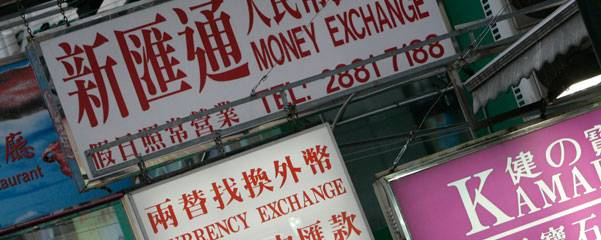Taking a Chance on China
Twenty-two years ago, Giles Chance T’85 gambled that China’s economy would take off. Earlier this fall, he shared his experience with students.

Giles Chance first visited China in 1988, during his honeymoon with his Beijing-born wife, whom he met while interning for the World Bank. “Although everything was still very backward,” he recalls of his three-week trip, “I could see that things were changing.” He knew he wanted to do business in China, but he was also smart enough to realize that he couldn’t compete with the Chinese on their home turf. So he started looking for things the Chinese couldn’t do.
Chance and his wife, an economist trained at the London School of Economics, decided to start a business with two functions: to help European companies enter the Chinese market, and help Chinese companies buy technology and know-how from the Europeans.
After three or four years, they amassed big-name clients such as Rolls Royce, Vodafone, Barclays Bank, and Marks & Spencer. With offices in London, Beijing, and Shanghai, they acted as agents for many European companies in scores of technology-transfer deals to Chinese state-owned companies, in industries as varied as aerospace, automobiles, and telecommunications.
With young kids at home and an increasingly crowded market for China-oriented businesses, they sold their company in 1996 for a tidy sum and relaxed for two years. Since then, Chance has stayed busy, opening an office for a British investment bank in Beijing, working on an e-commerce startup, starting a business helping Chinese companies raise capital in the United Kingdom, teaching at the Guanghua School of Management at Peking University, and writing a book called, “China and the Credit Crisis: The emergence of a new world order.”
Chance returned to Tuck for the first time in 21 years this term to teach the mini-course, Doing Business in China.
It was quite a gamble to start a business focused on the Chinese economy in 1989. How did you decide to take the risk?
It was a big act of faith, because it could have gone the other way, particularly after Tiananmen Square, which was in June 1989. But if it had gone wrong, I always reckoned that my downside was limited: I had an MBA from Tuck, which is a very marketable qualification, and it gives you much more confidence in doing something new, knowing that if it goes wrong you can change back to something else.
How did you end up teaching at Tuck?
I wrote this book and [senior associate dean] Bob Hansen wrote a blurb for the back cover and we’d been in contact over that. And then, at the end of last year, I was thinking, What am I going to do next year? One of the things I wanted to do was connect back with Tuck and try to find a way to use all my know-how and experience in China to benefit the students here. I wasn’t sure how I could do that. But Bob had the idea of actually doing a mini-course.
What did you cover in the course’s nine sessions?
We looked at China from a lot of different perspectives: history, geography and culture, and the background of the business environment; the government and legal system; China’s economic structure; competition and intellectual property rights; corruption and ethics; markets and marketing; investing and operating in China; portfolio investment into Chinese companies; and a final session called “China and the world.”
What’s your perspective on the proposed Currency Exchange Rate Oversight Reform Act, which will make it easier to designate China as a “currency manipulator” and impose higher tariffs on goods imported from China?
I think China does manipulate its currency. There’s certainly a case for thinking it’s undervalued, if you look at the trade surplus it’s built up since 2004. One measure of undervaluation is having consistently large trade surpluses; that’s the standard way of thinking the currency needs to appreciate. But China’s not the only country that manipulates its currency. The U.S. does it as well, by injecting liquidity into the system to stimulate growth by making the dollar weaker.
If Americans respond by putting import tariffs on Chinese products, the Chinese will retaliate. China is America’s third largest export market after Canada and Mexico. The Chinese will simply stop buying Boeing aircraft for a bit. Both sides will be damaged by it, and the outcome will not be what America wants.
What’s been the most rewarding thing about teaching Tuck students?
I think they’re just great people. They work hard and they’re very clever. They ask good questions, anticipate where you’re going, and they understand things very quickly. It’s good fun to be with them. What’s rewarding is that you can actually pass things you’ve learned on to them. They’re a receptive audience and they soak up much more than you think they have.
What’s it like to be back at Tuck after 20-plus years?
It’s amazing, really. Tuck has changed a lot for the better. I think it’s a much more rounded institution. The faculty is much bigger. There’s a much broader range of courses here, and I think it’s become much more global in outlook. Dean Danos has had a lot to do with that. That’s the path it’s going on and it’s done very well.